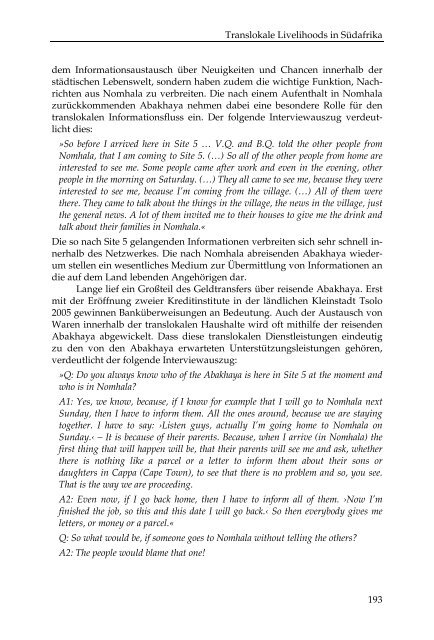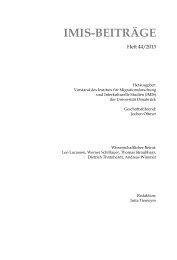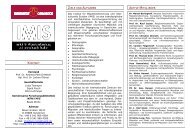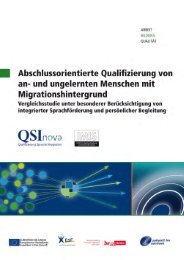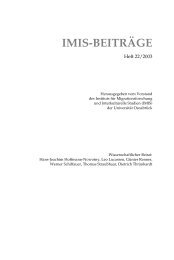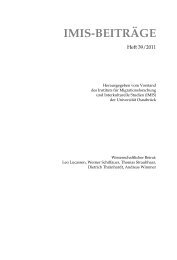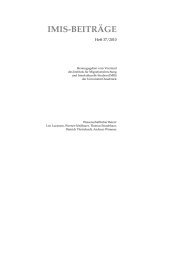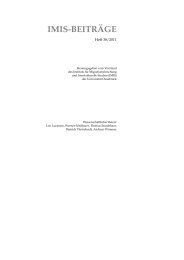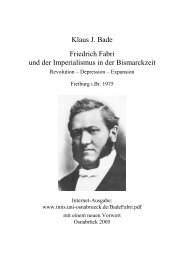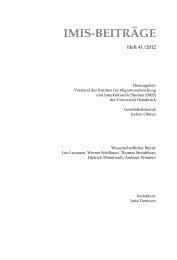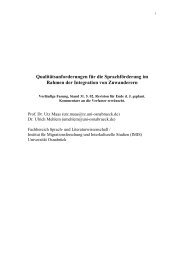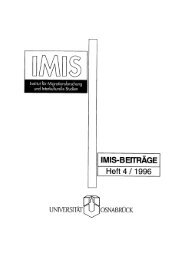Heft 42 - IMIS - Universität Osnabrück
Heft 42 - IMIS - Universität Osnabrück
Heft 42 - IMIS - Universität Osnabrück
Erfolgreiche ePaper selbst erstellen
Machen Sie aus Ihren PDF Publikationen ein blätterbares Flipbook mit unserer einzigartigen Google optimierten e-Paper Software.
Translokale Livelihoods in Südafrika<br />
dem Informationsaustausch über Neuigkeiten und Chancen innerhalb der<br />
städtischen Lebenswelt, sondern haben zudem die wichtige Funktion, Nachrichten<br />
aus Nomhala zu verbreiten. Die nach einem Aufenthalt in Nomhala<br />
zurückkommenden Abakhaya nehmen dabei eine besondere Rolle für den<br />
translokalen Informationsfluss ein. Der folgende Interviewauszug verdeutlicht<br />
dies:<br />
»So before I arrived here in Site 5 … V.Q. and B.Q. told the other people from<br />
Nomhala, that I am coming to Site 5. (…) So all of the other people from home are<br />
interested to see me. Some people came after work and even in the evening, other<br />
people in the morning on Saturday. (…) They all came to see me, because they were<br />
interested to see me, because I’m coming from the village. (…) All of them were<br />
there. They came to talk about the things in the village, the news in the village, just<br />
the general news. A lot of them invited me to their houses to give me the drink and<br />
talk about their families in Nomhala.«<br />
Die so nach Site 5 gelangenden Informationen verbreiten sich sehr schnell innerhalb<br />
des Netzwerkes. Die nach Nomhala abreisenden Abakhaya wiederum<br />
stellen ein wesentliches Medium zur Übermittlung von Informationen an<br />
die auf dem Land lebenden Angehörigen dar.<br />
Lange lief ein Großteil des Geldtransfers über reisende Abakhaya. Erst<br />
mit der Eröffnung zweier Kreditinstitute in der ländlichen Kleinstadt Tsolo<br />
2005 gewinnen Banküberweisungen an Bedeutung. Auch der Austausch von<br />
Waren innerhalb der translokalen Haushalte wird oft mithilfe der reisenden<br />
Abakhaya abgewickelt. Dass diese translokalen Dienstleistungen eindeutig<br />
zu den von den Abakhaya erwarteten Unterstützungsleistungen gehören,<br />
verdeutlicht der folgende Interviewauszug:<br />
»Q: Do you always know who of the Abakhaya is here in Site 5 at the moment and<br />
who is in Nomhala?<br />
A1: Yes, we know, because, if I know for example that I will go to Nomhala next<br />
Sunday, then I have to inform them. All the ones around, because we are staying<br />
together. I have to say: ›Listen guys, actually I’m going home to Nomhala on<br />
Sunday.‹ – It is because of their parents. Because, when I arrive (in Nomhala) the<br />
first thing that will happen will be, that their parents will see me and ask, whether<br />
there is nothing like a parcel or a letter to inform them about their sons or<br />
daughters in Cappa (Cape Town), to see that there is no problem and so, you see.<br />
That is the way we are proceeding.<br />
A2: Even now, if I go back home, then I have to inform all of them. ›Now I’m<br />
finished the job, so this and this date I will go back.‹ So then everybody gives me<br />
letters, or money or a parcel.«<br />
Q: So what would be, if someone goes to Nomhala without telling the others?<br />
A2: The people would blame that one!<br />
193


